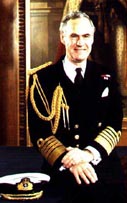Difference between revisions of "Julian Oswald"
(unstub) |
m (Text replacement - "He served as " to "He was ") |
||
| Line 22: | Line 22: | ||
}} | }} | ||
}} | }} | ||
| − | [[Admiral]] '''Sir John Julian Robertson Oswald''' was a senior [[Royal Navy]] officer. After training as a gunnery specialist, Oswald commanded a frigate and then a destroyer before achieving higher command in the navy. He | + | [[Admiral]] '''Sir John Julian Robertson Oswald''' was a senior [[Royal Navy]] officer. After training as a gunnery specialist, Oswald commanded a frigate and then a destroyer before achieving higher command in the navy. He was [[First Sea Lord]] and Chief of Naval Staff in the early 1990s. In that capacity he advised the British Government on the reduction in the size of the fleet under the [[Options for Change]] restructuring programme and on the deployment of Naval Support for the [[Gulf War]] in 1991. |
==Background== | ==Background== | ||
Latest revision as of 15:16, 2 May 2022
(mariner) | |
|---|---|
 | |
| Born | 11 August 1933 |
| Died | 19 July 2011 (Age 77) |
| Nationality | UK |
| Alma mater | Beaudesert Park School, Royal Naval College (Dartmouth), Royal College of Defence Studies |
| Parents | • George Hamilton Oswald • Margaret Elliott Oswald |
| Member of | European Atlantic Group, Royal United Services Institute for Defence Studies |
Admiral Sir John Julian Robertson Oswald was a senior Royal Navy officer. After training as a gunnery specialist, Oswald commanded a frigate and then a destroyer before achieving higher command in the navy. He was First Sea Lord and Chief of Naval Staff in the early 1990s. In that capacity he advised the British Government on the reduction in the size of the fleet under the Options for Change restructuring programme and on the deployment of Naval Support for the Gulf War in 1991.
Background
Oswald was born to Captain George Hamilton Oswald, RN and his wife Margaret Elliott Oswald (née Robertson). The Oswalds were a landed gentry family of Cavens, Dumfries and Auchincruive (now named "Oswald Hall"), South Ayrshire, Scotland, descending from merchant George Oswald, Rector of the University of Glasgow from 1797 to 1799,[1] Oswald was educated at Beaudesert Park School and the Royal Naval College, Dartmouth.[2]
He joined the Royal Navy as a cadet on 1 May 1947.[3] Oswald was given command of the frigate HMS Bacchante in January 1971 and then joined the staff of the Assistant Chief of the Defence Staff at the Ministry of Defence in 1972.[4] Promoted to captain on 31 December 1973,[5] he attended the Royal College of Defence Studies in 1976 before being given command of the destroyer HMS Newcastle in January 1977 and joining the Royal Navy Presentation Team in 1979.[4] He went on to be Captain of the Royal Naval College, Dartmouth in June 1980.[4] He was appointed Aide-de-Camp to the Queen on 7 July 1982[6] and was promoted to rear admiral on 2 September 1982[7] on his appointment as Assistant Chief of the Defence Staff (Programmes).[4]
Oswald became Assistant Chief of the Defence Staff (Policy and Nuclear) in January 1985[4] and went on to become Flag Officer, Third Flotilla and Commander, Anti-Submarine Warfare Striking Fleet in October 1985.[4] Promoted to vice-admiral on 3 January 1986, he was appointed a Knight Commander of the Order of the Bath in the 1987 New Year Honours.[8] He was promoted to full admiral on 29 May 1987,[9] on appointment as Commander-in-Chief Fleet and NATO Commander-in-Chief, Channel and Commander-in-Chief Eastern Atlantic.[4]
Advanced to Knight Grand Cross of the Order of the Bath in the 1989 New Year Honours,[10] Oswald became First Sea Lord and Chief of the Naval Staff in May 1989.[4] In that capacity he advised the British Government on the reduction in the size of the fleet under the Options for Change restructuring programme and on the deployment of Naval Support for the Gulf War in 1991: he also made the decision that members of the Women's Royal Naval Service should be allowed to serve in Royal Navy ships.[4] He was promoted to Admiral of the Fleet on his retirement in March 1993.[2][11]
Later career
In retirement Oswald became Chairman of Aerosystems International[2] and of Sema Group plc, an Information Technology business, until the latter was acquired in 2001.[12] He was also President of the Sea Cadet Association, Vice-President of the Royal United Services Institute and a Trustee of the National Maritime Museum.[2] His interests included walking, stamp-collecting, family and fishing.[2] He died at his home at Shedfield in Hampshire on 19 July 2011.[13]
References
- ↑ Burke's Landed Gentry, 16th edition, ed. L. G. Pine, Burke's Peerage Ltd, p. 1925
- ↑ a b c d e Who's Who 2010, A & C Black, 2010, ISBN 978-1-408-11414-8
- ↑ Heathcote, p. 203
- ↑ a b c d e f g h i Heathcote, Tony (2002). The British Admirals of the Fleet 1734 – 1995. Pen & Sword Ltd. ISBN 0-85052-835-6. page 204
- ↑ https://www.thegazette.co.uk/London/issue/46174/supplement/263
- ↑ https://www.thegazette.co.uk/London/issue/49047/supplement/9145
- ↑ https://www.thegazette.co.uk/London/issue/49122/supplement/12541
- ↑ https://www.thegazette.co.uk/London/issue/50764/supplement/2
- ↑ https://www.thegazette.co.uk/London/issue/50927/supplement/6737
- ↑ https://www.thegazette.co.uk/London/issue/51578/supplement/2
- ↑ https://www.tandfonline.com/doi/abs/10.1080/03071849308445694?journalCode=rusi20
- ↑ http://www.secinfo.com/dV5Ff.4f8Y5.2.htm#1stPage
- ↑ https://www.telegraph.co.uk/news/obituaries/military-obituaries/naval-obituaries/8650677/Admiral-of-the-Fleet-Sir-Julian-Oswald.html
Wikipedia is not affiliated with Wikispooks. Original page source here